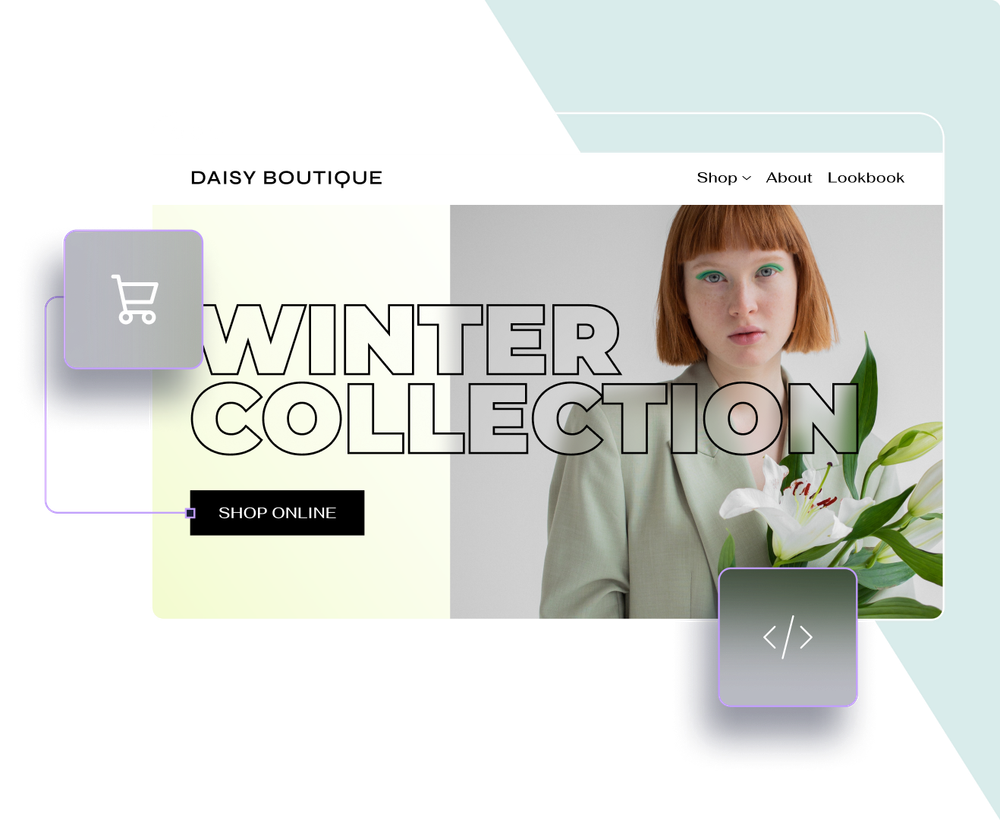

Give your clients a tailored, end-to-end eCommerce experience, built with the independent store components you choose, not the capabilities an eCommerce provider has chosen for you.





Duda always provides the out-of-the-box components of store pages, cart and widgets, but you can integrate any other custom component into your store. Use integrations through REST API, Zapier automations, apps and JavaScript based customizations.
Sometimes businesses require a payment gateway that’s different from what Stripe and PayPal have to offer. This could be the result of what people are used to and trust in a certain country, the type of products sold and more.
Using a rich set of API, your agency can easily offer and connect custom payment gateways to a site while store visitors have a seamless shopping experience. Implementation is standard and built right into the Duda platform.
After connecting a custom payment gateway once, you can easily add it to any other future store, accelerating the scalability of your business.
Consult our
Payment Gateways API and
eComm Payment APIs documentation.
Saas platforms that have access to or manage their merchants’ catalog elsewhere often need to sync it with the store. For this case, syncing with an external catalog can be a great solution.
Multiple locations selling the same catalog (like convenient stores for example), or franchises of a bigger company (like auto shops or wellness products) are some of this case's examples.
Using Duda’s product catalog API gives you full management control over the store's catalog. This includes details like product images, categories, prices, inventory, SKUs and more. Update the catalog just once and it will instantly update everywhere.
Consult our
eComm Products API for more info and documentation.
When merchants with an established physical store start thinking about selling online too, they’re faced with the need to ensure they always sell what they can commit to and provide. This means merchants need an easy way to sync between two or more store inventories.
You can achieve this with a 2-step process:
Consult our
eComm
Orders
API
and
Webhook Events Reference guides for more info and documentation.
Agencies that specialize in a certain market niche can leverage a previously created catalog in order to cut production time with the next client.
To give an example, if you've built an online store for an auto parts merchants, you can use that same catalog as a good base for any other clients you may have later on, selling the same auto parts.
Take advantage of Duda’s custom templates option - save the default product catalog as part of a custom template. Then, any site you create based off of this template will already include that same default catalog. Add the minor tweaks to accommodate it to each merchant either through the store’s catalog management or through API.
Learn more about
Custom Site Templates and our
eComm Products API documentation.
Customized communication answers the need for omnichannel sales and updating buyers. It gives merchants the added value of reaching out to audiences in the channel they prefer and feel comfortable with, like text or WhatsApp messages instead of or in addition to, standard emails.
Using a webhook triggered by newly created orders in combination with our orders API, you can instantly know about and text the buyer as soon as a new store order comes in. Easily set up and adjust these messages to your client’s tone of voice and messaging.
Consult our
Webhook Events Reference doc and
eComm Orders API documentation.
Often merchants will prefer to work with specific shipping providers due to location or business constraints. You can incorporate any custom shipping provider into your client’s store, as long as that provider has an integration option.
Use the custom shipping API to set up and integrate external shipping providers with your eComm sites. If you want, you can also hide the default shipping options Duda provides.
Consult our
Custom Shipping API documentation.
This is relevant for businesses and agencies that operate multiple stores within the same market, and are looking to create a price comparison or marketplace site where many merchants’ offers are grouped together, like the shopping experience on NewEgg.com.
You can easily sync data from multiple catalogs using Duda’s Product API with webhooks to aggregate all offers for the same product, and display them all on the site with links to each store’s product page.
Consult our
Product API documentation.
